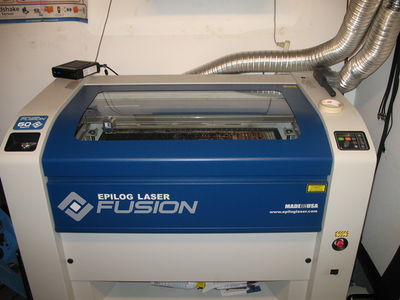Difference between revisions of "Epilog Laser Cutter"
LloydBlack (talk | contribs) |
LloydBlack (talk | contribs) |
||
| Line 1: | Line 1: | ||
{{Under Construction}} | {{Under Construction}} | ||
| + | |||
== The Basics == | == The Basics == | ||
| Line 150: | Line 151: | ||
Source: https://www.epiloglaser.com/how-it-works/laser-material-compatibility.htm | Source: https://www.epiloglaser.com/how-it-works/laser-material-compatibility.htm | ||
| + | |||
| + | ''' (I'm still working on this page. Please make edits carefully. - Lloyd Black) ''' | ||
Revision as of 06:32, 29 June 2016
This page is currently under construction, please avoid full page edits while this notice is in place. Sectional edits are safe but whole page edits could create conflicts between revisions.
Contents
The Basics
The laser cutter is a 60 watt CO2 laser which can cut and engrave. It weighs about 500 lbs.
It can be used with raster and vector type images.
There's a range of software that can be used with the laser cutter.
Here's a short list example of software that can be used.
For raster images:
- Gimp
- Photoshop
For vector images:
- DraftSight
- AutoCAD
- Adobe Illustrator
- Inkscape (free software)
The laser is used with different software as if it's a printer. Different results can be accomplished by adjusting the speed and power of the laser.
There's also a "Rim-Drive Rotary Attachment" that is for use with our laser cutter. The rotary tool is used for engraving round materials like bottles, glasses, etc..
Using the Laser Cutter
In order to use the laser cutter, you must be a member of FamiLAB. You must also be certified to use the laser cutter. Becoming certified involves taking a Beginner Laser Class.
Using the laser cutter is fairly simple and safe if proper usage precautions are taken. These precautions include some basic steps that are important for using the laser cutter.
Four of the first steps are the following:
- Make sure the AC is on and around 74F (23C) as the laser cutter needs to be kept cool. The laser cutter should never be used when the temperature is near or at 90F (32C).
- Make sure the exhaust fan is on which pulls the air from the laser cutter. The breakers for this are marked in the breaker panel in the Machine Shop.
- Make sure the Air Assist is on next to the laser cutter.
- Make sure the laser cutter is on.
The Beginner Laser Class
The Beginner Laser Class is held every other Saturday. Check the FamiLAB Calendar for when it's scheduled.
The class normally includes two parts. The first part is a presentation focused on safety and precautions using the laser cutter. The second part is a hands on example of how to use the laser cutter. Each person will be able to use the laser cutter using Adobe Illustrator.
Material Compatibility for the Laser Cutter/Engraver
Materials that are safe or not safe to use on the laser cutter/engraver.
If the material isn't listed here contact someone on the "Point of Contact" list and ask.
| Material | Engrave | Cut |
|---|---|---|
| Acrylic | Yes | Yes |
| Anodized Aluminum | Yes | |
| Bare Metals | * | |
| Brass | * | |
| Carbon Fiber | -->No!<-- | -->No!<-- |
| Ceramic | Yes | |
| Cloth | Yes | Yes |
| Coated Metals | Yes | |
| Corian | Yes | Yes |
| Cork | Yes | Yes |
| Delrin | Yes | Yes |
| Fabric | Yes | Yes |
| Fiberglass | -->No!<-- | -->No!<-- |
| Foam (most formulations) | Yes | Yes |
| Glass | Yes | |
| Leather | Yes | Yes |
| Marble | Yes | |
| Matte Board | Yes | Yes |
| MDF Board | -->No!<-- | -->No!<-- |
| Melamine | Yes | Yes |
| Mylar | Yes | Yes |
| Painted Metals | Yes | |
| Paper | Yes | Yes |
| Plastic | Yes | Yes |
| Pressboard | Yes | Yes |
| Printed Circuit Boards | -->No!<-- | -->No!<-- |
| PVC | -->No!<-- | -->No!<-- |
| Rubber (most formulations) | Yes | Yes |
| Stainless Steel | * | |
| Tile | Yes | |
| Titanium | * | |
| Wood | Yes | Yes |
| Wood Veneer | Yes | Yes |
- CO2 lasers will mark bare metals when coated with a metal marking solution.
Under NO condition should the laser be used with PVC. It will damage the laser and void the warranty. Additionally, the PVC will let off chlorine gas which will kill you.
Most of the information for the material compatibility list was obtained from Epilog Laser's website:
Source: https://www.epiloglaser.com/how-it-works/laser-material-compatibility.htm
(I'm still working on this page. Please make edits carefully. - Lloyd Black)
